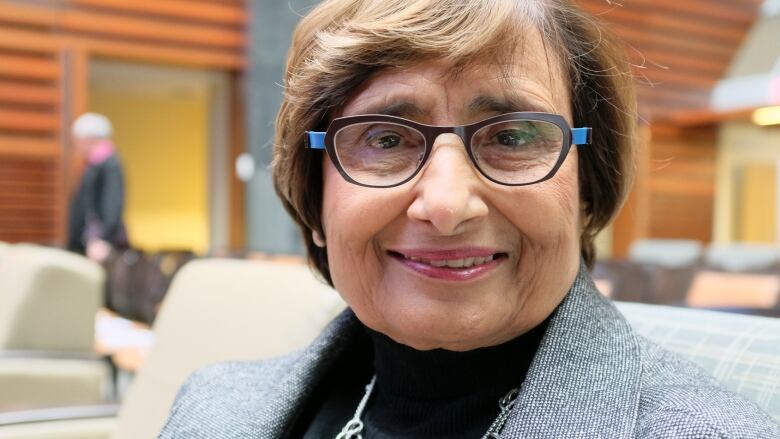Pioneering preemies focus of McMaster MD's book
Neonatal expert Dr. Saroj Saigal behind book of letters, history of care, called Preemie Voices

Once they were tiny babies, born premature and weighing less than two pounds, clinging to life at McMaster Children's Hospital. Today, those babies are "pioneers," said the doctor who has studied them for their entire lives.
A group of 16 former "preemies" gathered at the Hamilton hospital on Monday World Prematurity Day for the book launch of Preemie Voices, by Dr. Saroj Saigal.
Never give up on your children. And if youre a preemie, never give up on yourself because you can succeed. Its hard, but its worth it.- MichelleSmedes
Today, more than 90 per cent of premature babies survive, a dramatic increase over 40-60 years ago. But, being born too soon still increases the risk of having disabilities like cerebral palsy and blindness, while issues like underdeveloped lungs also cause difficulties.
"Its still precarious, its still scary, if youre the mother or father its still very scary," Saigal told CBC News, adding the preemies in the room today, now in their 30s, were some of the first babies to ever receive specialized intensive care.
"Theyre pioneers, actually, in survival."
Preemies focus on overcoming odds

"We were stunned at how well they were doing compared to what we were predicting,"Saigalsaid.
Today shes still studying those former preemies, many of whom now live independently and hold jobs in journalism, medicine and law. But as she was asking her latest round of clinical questions, Saigal also wanted to know about something more intangible.
"How do the children feel about themselves?"
Those answers are contained in a series of letters to Saigal that make up the first part of Preemie Voices, pieces of writing she calls "candid and beautiful."
Michelle Smedes, who was born weighing one pound 11 ounces, wanted her piece to serve as motivation for those facing a premature birth.
"Never give up on your children. And if youre a preemie, never give up on yourself because you can succeed. Its hard, but its worth it," said Smedes.
Her hearing and vision problems made learning English and Math a struggle, while sports I couldnt see the ball were also tough. But despite being the only preemie in her school, Smedes overcame those struggles. Today, speaking for herself but fielding questions through an intervener, she was thrilled about adding published author to her list of accomplishments.

Hamilton lawyer Amanda McInnis, dressed in a sharp purple suit she made herself, echoed the idea of overcoming the odds.
I was very ill for about my first ten years, McInnis said.
A series of seizures, possibly linked to her prematurity, kept her and her parents in and out of the hospital. As an only child, it played a huge role in her life, and that of her parents.
Theyve always made sure that I remember, and find strength in the fact that I had such difficult beginnings and was able to overcome those.
Mac backs self-published work
For John Guise, a journalist and another preemie in attendance, the disabilities werent as severe, but the experience still mattered.
"Being premature, it didnt have a negative effect on things. It probably drove a bunch of us," he said, pointing to his decision to travel and work in China for ten years.
"Would I have done that if I didnt have the background that I did? I dont know. I have a feeling that that probably drove me to take the chances more than I would have otherwise."

Saigal said getting her former patients to write was easy, but finding a publisher interested in the collection thats neither a textbook nor pure fiction was difficult. In the end, Preemie Voices was self-published, with the help of McMasters Department of Pediatrics (which should really get the limelight, Saigal insists.)
The books second half, penned by Saigal herself, chronicles the improvements in the neonatal field, many of which were made at McMaster which hasthe largestNICU in Ontario.
The science clearly came second for Saigal on Monday, as she hugged each of her former patients (speaking with colleagues at work, she often slips and refers to them as "our children," she admits) trickled in to the atrium ahead of the books launch.
"Im just so emotional to see these tiny little babies we looked after, and now theyre independent adults and doing really well," Saigal said.












_(720p).jpg)


 OFFICIAL HD MUSIC VIDEO.jpg)
.jpg)



























































































